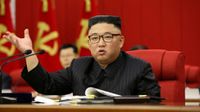
Communism is a political ideology which transforms the state into an organisation that centrally controls the economy. While limiting the economic agency of individuals, it also usurps their political liberties by undermining democratic elections. In a communist system, the political competition between parties is limited by the control of government and its policy processes. To exert control over society, communist governments often attempt to regulate every aspect of human life. One’s private life becomes a fictional construct, as it is subsumed into the public realm that is subjected to the policies, laws and programs enacted by the government. Communism therefore, destroys freedom, as with the case of North Korea
How Communism is damaging North-Korean society
During the early 20th century, Korea was colonised by the Japanese and was later freed after Japan lost the Second World War. This resulted in two separate polities —North and South— which were managed by the Cold War powers of America and the Soviet Union. South Korea represented freedom, while North Korea represented state-sanctioned repression and control over society.
One of the factors that caused North Korea to experience a famine from the 1990s onwards, was the Stalinist system of agricultural production, which according to some analysts, had a destructive impact on farmers’ ability to grow crops. Under this policy, farmers were forced at the point of a gun to give up their individual farms and to move to collective farms to do work. Even though North Korea received food from China and the then Soviet Union, these donations gradually declined. The little available food was dispensed, not according to individual needs but depending on the perception of one’s loyalty to the government. As such, Communism thrives through government control of the flow of resources in society, at the expense of those who might be seen as an “enemies of the “revolution”.
In the aftermath of the famine, millions of people lost their lives due to the disastrous impact of communist policies. Even though the North Korean government sought to spin the narrative that only 235 000 people might have died, what contradicts this view are estimates which show that between 2,5 to 3,5 million people perished due to the famine. Quite recently, it was reported that the North Korean government slashed food rations from 360g to 300g per person. This highlights the suffering in communist countries, where instead of creating a utopia, governments are hell bent on power preservation.
In addition to having millions of hungry people, North Korea has no rule of law but a dictatorship, with complete disdain for human rights. Amnesty International has brought to light that citizens who aspire for a better life elsewhere often have to pay bribes to officials in order to leave the country, something viewed by the government as a criminal offence.
Amnesty International further submits that there are currently 100 000 North Koreans in prison, with many not having been “convicted of an internationally recognisable criminal offence.” What is more concerning is that once people are imprisoned, they are subjected to torture, receive inadequate or no food and do not have access to lawyers, their family members or a just trial. The state even banishes people to mountainous areas if they are related to those seen as “threats” to the state.
There is also no press freedom in North Korea, which prevents citizens from being informed about developments in their society and the world at large. The government has taken control of media platforms, television and radio, as well as the internet and some journalists have been thrown in jail.
It is therefore evident that communism is a political and economic system that perpetuates the erosion of liberty and economic collapse. To prevent such ideas from flourishing in our liberal democracies, we should always be cognisant of the suffering endured in communist countries, ironically marketed to the poor as “utopias” for the working class.
Cover image of Kim Jong-un, Supreme Leader of North Korea. Image source available here.
